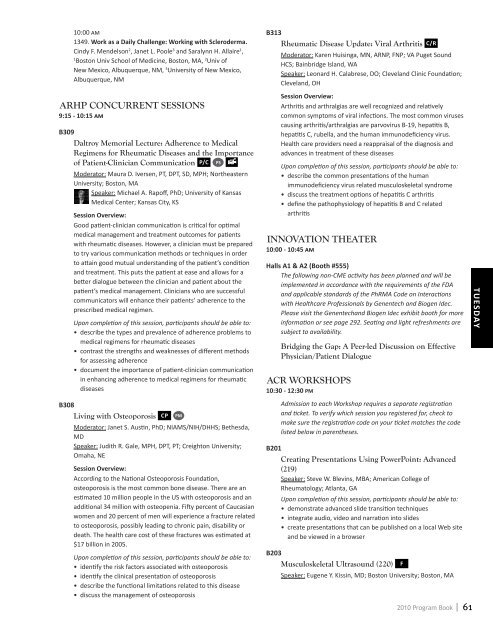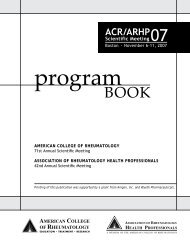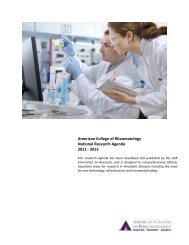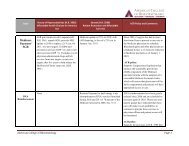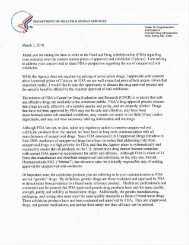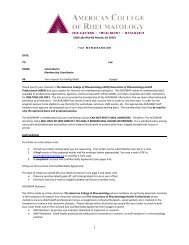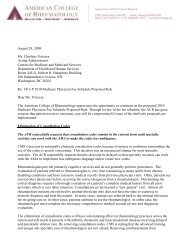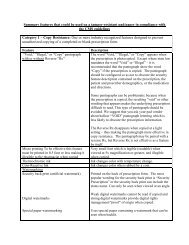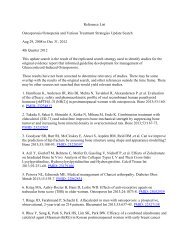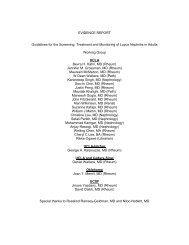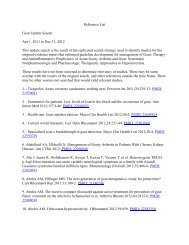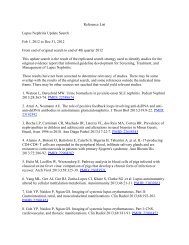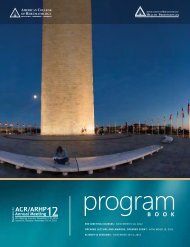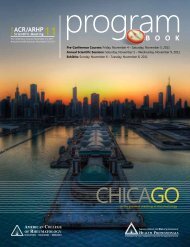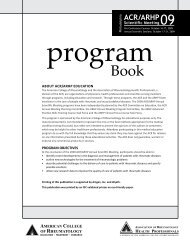B O O K - American College of Rheumatology
B O O K - American College of Rheumatology
B O O K - American College of Rheumatology
You also want an ePaper? Increase the reach of your titles
YUMPU automatically turns print PDFs into web optimized ePapers that Google loves.
10:00 am<br />
1349. Work as a Daily Challenge: Working with Scleroderma.<br />
Cindy F. Mendelson 2 , Janet L. Poole 3 and Saralynn H. Allaire 1 ,<br />
1<br />
Boston Univ School <strong>of</strong> Medicine, Boston, MA, 2 Univ <strong>of</strong><br />
New Mexico, Albuquerque, NM, 3 University <strong>of</strong> New Mexico,<br />
Albuquerque, NM<br />
ARHP Concurrent Sessions<br />
9:15 - 10:15 am<br />
B309<br />
Daltroy Memorial Lecture: Adherence to Medical<br />
Regimens for Rheumatic Diseases and the Importance<br />
<strong>of</strong> Patient-Clinician Communication P/C PS<br />
Moderator: Maura D. Iversen, PT, DPT, SD, MPH; Northeastern<br />
University; Boston, MA<br />
Speaker: Michael A. Rap<strong>of</strong>f, PhD; University <strong>of</strong> Kansas<br />
Medical Center; Kansas City, KS<br />
Session Overview:<br />
Good patient-clinician communication is critical for optimal<br />
medical management and treatment outcomes for patients<br />
with rheumatic diseases. However, a clinician must be prepared<br />
to try various communication methods or techniques in order<br />
to attain good mutual understanding <strong>of</strong> the patient’s condition<br />
and treatment. This puts the patient at ease and allows for a<br />
better dialogue between the clinician and patient about the<br />
patient’s medical management. Clinicians who are successful<br />
communicators will enhance their patients’ adherence to the<br />
prescribed medical regimen.<br />
Upon completion <strong>of</strong> this session, participants should be able to:<br />
• describe the types and prevalence <strong>of</strong> adherence problems to<br />
medical regimens for rheumatic diseases<br />
• contrast the strengths and weaknesses <strong>of</strong> different methods<br />
for assessing adherence<br />
• document the importance <strong>of</strong> patient-clinician communication<br />
in enhancing adherence to medical regimens for rheumatic<br />
diseases<br />
B308<br />
Living with Osteoporosis cP PM<br />
Moderator: Janet S. Austin, PhD; NIAMS/NIH/DHHS; Bethesda,<br />
MD<br />
Speaker: Judith R. Gale, MPH, DPT, PT; Creighton University;<br />
Omaha, NE<br />
Session Overview:<br />
According to the National Osteoporosis Foundation,<br />
osteoporosis is the most common bone disease. There are an<br />
estimated 10 million people in the US with osteoporosis and an<br />
additional 34 million with osteopenia. Fifty percent <strong>of</strong> Caucasian<br />
women and 20 percent <strong>of</strong> men will experience a fracture related<br />
to osteoporosis, possibly leading to chronic pain, disability or<br />
death. The health care cost <strong>of</strong> these fractures was estimated at<br />
$17 billion in 2005.<br />
Upon completion <strong>of</strong> this session, participants should be able to:<br />
• identify the risk factors associated with osteoporosis<br />
• identify the clinical presentation <strong>of</strong> osteoporosis<br />
• describe the functional limitations related to this disease<br />
• discuss the management <strong>of</strong> osteoporosis<br />
B313<br />
Rheumatic Disease Update: Viral Arthritis c/r<br />
Moderator: Karen Huisinga, MN, ARNP, FNP; VA Puget Sound<br />
HCS; Bainbridge Island, WA<br />
Speaker: Leonard H. Calabrese, DO; Cleveland Clinic Foundation;<br />
Cleveland, OH<br />
Session Overview:<br />
Arthritis and arthralgias are well recognized and relatively<br />
common symptoms <strong>of</strong> viral infections. The most common viruses<br />
causing arthritis/arthralgias are parvovirus B-19, hepatitis B,<br />
hepatitis C, rubella, and the human immunodeficiency virus.<br />
Health care providers need a reappraisal <strong>of</strong> the diagnosis and<br />
advances in treatment <strong>of</strong> these diseases<br />
Upon completion <strong>of</strong> this session, participants should be able to:<br />
• describe the common presentations <strong>of</strong> the human<br />
immunodeficiency virus related musculoskeletal syndrome<br />
• discuss the treatment options <strong>of</strong> hepatitis C arthritis<br />
• define the pathophysiology <strong>of</strong> hepatitis B and C related<br />
arthritis<br />
InnoVAtion Theater<br />
10:00 - 10:45 am<br />
Halls A1 & A2 (Booth #555)<br />
The following non-CME activity has been planned and will be<br />
implemented in accordance with the requirements <strong>of</strong> the FDA<br />
and applicable standards <strong>of</strong> the PhRMA Code on Interactions<br />
with Healthcare Pr<strong>of</strong>essionals by Genentech and Biogen Idec.<br />
Please visit the Genentechand Biogen Idec exhibit booth for more<br />
information or see page 292. Seating and light refreshments are<br />
subject to availability.<br />
Bridging the Gap: A Peer-led Discussion on Effective<br />
Physician/Patient Dialogue<br />
ACR Workshops<br />
10:30 - 12:30 PM<br />
Admission to each Workshop requires a separate registration<br />
and ticket. To verify which session you registered for, check to<br />
make sure the registration code on your ticket matches the code<br />
listed below in parentheses.<br />
B201<br />
Creating Presentations Using PowerPoint: Advanced<br />
(219)<br />
Speaker: Steve W. Blevins, MBA; <strong>American</strong> <strong>College</strong> <strong>of</strong><br />
<strong>Rheumatology</strong>; Atlanta, GA<br />
Upon completion <strong>of</strong> this session, participants should be able to:<br />
• demonstrate advanced slide transition techniques<br />
• integrate audio, video and narration into slides<br />
• create presentations that can be published on a local Web site<br />
and be viewed in a browser<br />
B203<br />
Musculoskeletal Ultrasound (220) f<br />
Speaker: Eugene Y. Kissin, MD; Boston University; Boston, MA<br />
2010 Program Book 61<br />
tuesday


